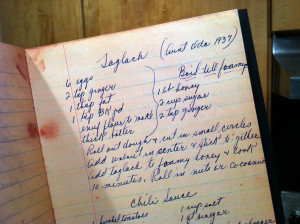As September draws to a close, this 29th day of the month brings Michaelmas, the Feast of Michael the Archangel, and this year, in the Jewish calendar, Yom Kippur begins with the setting sun.
I am reminded every now and then that blogs are great but real books are still the cat’s pajamas, for me, anyway. We are in the midst now of Week Two of a period where our blog platform won’t allow me to upload new media and where updates to the plug-ins won’t install. This sort of thing has happened before and I’m sure it will happen again. Seth Thompson is my go-to man of patience in these matters, and while he figures out the source of the current mystery and tries to make things right, it may be necessary to revisit a few past Book of Days chapters for the days that come. This one, for Michaelmas, is from just last year, improved a bit, based on some books––real books, off of real bookshelves––that I’ve been reading lately. Enjoy.
I wonder sometimes about the people who come into our lives just when you need them––the ones who drift in, do something good, then disappear. I am thinking right now of the random driver years ago who pulled in front of me on the road and slowed me down just long enough to protect me from the driver at the intersection ahead of us both who blew through a stop sign. Were it not for the slow guy suddenly in front of me, I would have been broadsided by that car that did not stop. So with thanks to that person I’ll never know, my fist-shaking and swearing became a sigh of relief. It does seem at times like I get through life with a measure of help from people just like this. What if it’s always the same person?
Today is Michaelmas (pronounced mick-il-mus). It is the Feast of Michael the Archangel, but angels abound in cultures throughout the world, we know this. And so it is fitting to celebrate not just Michael, but all angels, and various traditions will honor today Michael as well as Gabriel and Raphael. Others will include Uriel, Raguel, Ramiel, and Sariel. I love these names, names that come out of a long and complex etymological history, names that in their true form would be Micha-el, Gabri-el, Rapha-el, Uri-el, Ragu-el, Rami-el, Sari-el. The “-el” is Sumerian in origin, signifying “brightness” or “shining.” The etymology connects to the Akkadian ilu (radiant one), Babylonian ell (shining one), Old Welsch ellu (shining being), Old Irish aillil (shining), Anglo-Saxon aelf (radiant being), and English elf (shining being).
The list of angels continues, across Judaism, Christianity, Islam, and beyond to other cultures, too: Camael, Jophiel, and Zadkiel; Anael, Simiel, and Oriphiel; Metatron, Israfil, and Malak al-Maut. Perhaps they are not all cherubim and seraphim, winged beings. Perhaps they are right here with us, looking just like us, driving cars when they need to and getting in our way, slowing us down when we need slowing down.
As for Michael the Archangel: He is the first of the archangels and the leader of the hosts of heaven. He likes heights: he is a protector of mountain tops and high places. He is, as well, a patron of cemeteries. His feast day comes with increasing night: we are a week past the equinox now and our nights in the Northern Hemisphere grow increasingly dark as we shave off a few minutes of daylight with each passing day. Darkness can be scary. It is a good time to call down the power of archangels for protection.
Struan Micheil, or Michaelmas bannocks, very much like scones, are typically made in Scotland on the Eve of Michaelmas (that would have been last night) from equal amounts of oat, rye, and barley flour, but I don’t see why you couldn’t make those bannocks today or this weekend (that’s my plan for Saturday). Tradition would have us make our Michaelmas bannocks without the use of metal: wooden fork, wooden or ceramic mixing bowl, stone for baking. Dinner might be roast goose, for Michaelmas coincides with the migration of geese. We call down the goose as we call down the angel. In some places, nuts are roasted and cracked for Michaelmas (a tradition that is part of many celebrations during these days of harvest).
It is the humble blackberry that is the center of the culinary traditions of Michaelmas, and we would do well to have our Michaelmas bannocks with fresh blackberries or with blackberry jam. The story goes that Satan, after his battle with Michael the Archangel, fell to earth from heaven and landed in a bramble patch, and each year on Michaelmas, Satan returns to curse and spit upon the brambles that he landed upon. And so we eat them up before this happens. Many folks will refuse to harvest blackberries after the 29th of September. It’s just not worth it; they could be cursed.
Last year for Michaelmas I gave you a song and I think I will leave you with that same song again this year, for it is perhaps the best song you’ll find to honor and invoke angels. It’s called “Calling All Angels” and it’s by Jane Siberry, a song she wrote and recorded as a duet with k.d. lang for the 1993 Siberry album When I Was a Boy. And so here, for you for Michaelmas, are two of my favorite Canadians singing the song live in Houston. It’s a homemade video, filmed by someone who was there in the audience that night, and in the very last few frames of the video, a woman in the audience turns to the camera and it is in those last few seconds that we witness the emotional power of a song, of a poem. This is what it’s all about, isn’t it? Connexions across time and space, whether human or angelic. Do we protect others? Bring out their best qualities? Are we each others’ guardian angels? Do we create heaven on earth? Do we choose to turn coal into diamonds? Believe what you will about angels. These daily decisions are ours to make.
Image: “Have a chair.” “Thank you, I have one.” Sometimes our guardian angels slow us down with newly-varnished chairs. In the 1947 film The Bishop’s Wife, David Niven plays a bishop who prays for help and receives it in the form of an angel played by Cary Grant. Seth and I watch it every year at Christmastime.
Since this chapter of the Convivio Book of Days was first published in 2016, Jane Siberry has released a new record. Its title? Angels Bend Closer. How fitting for today.


